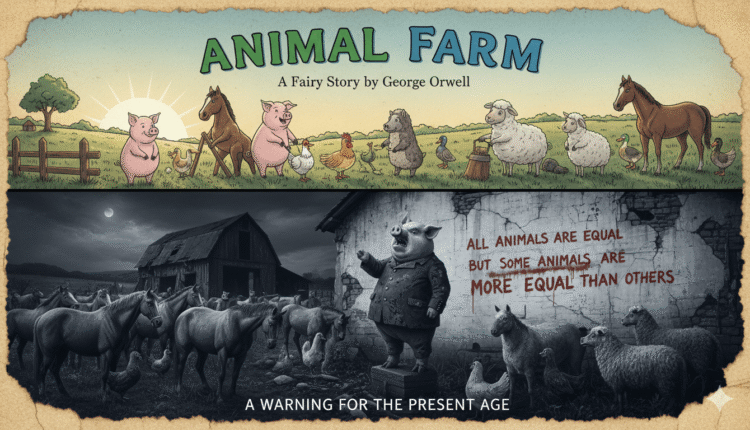Animal Farm: The Fable That Speaks to Our Times
A simple farm tale reveals a deep warning about power and corrupted ideals.
By Prof. Imran Ismail Chohan
Animal Farm by George Orwell looks almost childlike on the surface—”a story of barnyard animals rebelling against their human master.” But under its plain appearance is one of the greatest and longest-lasting political allegories ever penned. Reading it nowadays seems almost prophetic.
The tale starts off with a dream—a dream of equality and freedom. The animals, who are fed up with exploitation by humans, resolve to build a just society where no one lacks food and all share the proceeds of their work. Their new utopia, Animal Farm, emerges out of hope and justice.
But the dream does not last. Gradually, the pigs—formerly comrades—start taking over. They alter rules, rewrite history, and distort facts to perpetuate power. “All animals are equal,” they used to say, but eventually it transforms into, “All animals are equal, but some animals are more equal than others.” By the time the other animals know the truth, their utopia is no different from the tyranny they had ousted.
And that’s when Animal Farm ceases to be an animal story—it becomes a mirror held to humanity. The manipulation, propaganda, distortion of facts, and employment of fear to manage are not old-fashioned relics of Orwell’s time—they are power tools employed today.
Every generation has its own “pigs”—those smooth-talking voices that promise fairness while tightening their grip. Every society risks becoming an Animal Farm when its citizens stop questioning and start obeying.
What is most disquieting about Orwell’s fable is its timeless quality. Whether it’s the manipulation of fact in the press, the decay of accountability in politics, or the recurrence of revolutions that substitute one kind of oppression for another, Animal Farm seems “a warning written for the present age.
But Orwell does not leave us hopeless. Under his cynicism is an appeal—”to remain awake, to uphold truth, to challenge power, and to recall what equality means.” For when words do not mean what they say, when promises are turned into tools of domination, when we forget the past—we consign ourselves to repeat it.
Animal Farm is not a book that you read. “It’s a book that reads you.” It poses to each of us a question that resonates beyond its covers:
“In a world full of noise and manipulation, am I thinking for myself—or just following the herd?”
And that is what keeps Orwell’s classic alive—decade after decade, generation after generation.
Read More: Artificial Intelligence and Health Law: Building Trust in Pakistan’s Medical Future


Comments are closed, but trackbacks and pingbacks are open.